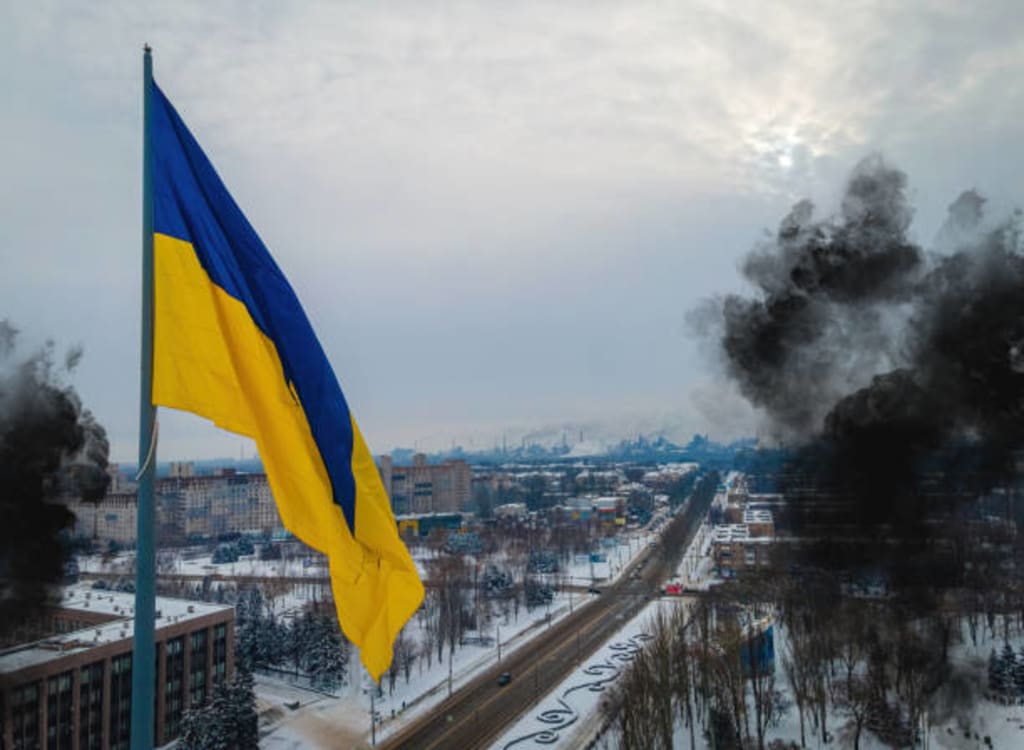
As of my last knowledge update in September 2021, tensions between Ukraine and Russia had been ongoing for several years, and there was a conflict in eastern Ukraine involving pro-Russian separatist groups and Ukrainian armed forces. However, I don't have any information about the specific developments or status of the conflict beyond that point.
To get the most up-to-date and accurate information on the current situation, I recommend referring to reliable news sources or conducting an internet search for recent news articles.I apologize for any confusion. As an AI language model, my responses are based on information available up until September 2021, and I don't have real-time updates. At that time, there was an ongoing conflict in eastern Ukraine between Ukrainian government forces and separatist groups supported by Russia. The conflict began in 2014 following Russia's annexation of Crimea.
To obtain the latest information on the Ukraine-Russia situation, I suggest referring to reputable news sources or conducting an internet search for recent news articles, as the situation may have evolved since my last update.
Negative aspects of wars:
Wars have numerous negative aspects, impacting various aspects of society and individuals' lives. Some of the key negative consequences of wars include:
Loss of life: Wars result in the tragic loss of human lives on a massive scale. Soldiers, civilians, and innocent bystanders are often caught in the crossfire, leading to immeasurable suffering and grief for families and communities.
Destruction of infrastructure: Armed conflicts inflict severe damage to infrastructure, including homes, hospitals, schools, roads, and utilities. This destruction hampers the functioning of societies and makes post-war recovery and reconstruction challenging and costly.
Displacement and refugee crisis: Wars force people to flee their homes, resulting in a significant number of internally displaced persons and refugees. These individuals face dire living conditions, inadequate access to basic necessities, and a heightened risk of violence and exploitation.
Economic consequences: Wars have a devastating impact on economies, causing widespread disruption, loss of livelihoods, and economic instability. The costs of war, including military expenses and post-war reconstruction, place a substantial burden on governments and hinder social and economic development.
Environmental degradation: Armed conflicts often result in significant environmental damage. Pollution from military operations, destruction of natural habitats, deforestation, and the use of weapons with long-lasting environmental effects (such as chemical weapons) contribute to ecological destruction and long-term health risks.
Psychological trauma: The psychological impact of war extends far beyond physical injuries. Survivors and witnesses of war experience trauma, including post-traumatic stress disorder (PTSD), anxiety, depression, and other mental health issues. The effects can persist for years, even after the conflict has ended.
Political instability and regional tensions: Wars can lead to political instability within nations and exacerbate regional tensions. Post-war power struggles, ethnic or sectarian divisions, and the emergence of extremist groups can prolong conflicts and create further instability in the affected regions.
Loss of cultural heritage: Wars often result in the destruction of historical landmarks, artifacts, and cultural sites that hold significant value for communities and humanity as a whole. The loss of cultural heritage erases important aspects of identity, history, and shared heritage.
Human rights abuses: During times of war, human rights violations are frequently perpetrated, including indiscriminate attacks on civilians, sexual violence, forced displacement, torture, and the recruitment of child soldiers. These abuses further contribute to the suffering and perpetuate cycles of violence.
It is essential to acknowledge these negative aspects and work towards peaceful resolutions and conflict prevention to mitigate the devastating consequences of wars.
Causes of Russia Ukraine war:
The Russia-Ukraine conflict has its roots in a complex set of historical, political, and geopolitical factors. While it is important to note that there are varying perspectives on the causes of the conflict, I can provide you with an overview of some key factors that contributed to the tensions and the outbreak of the war.
Historical Background: The historical relationship between Russia and Ukraine is characterized by a complex interplay of cooperation and tensions. Ukraine was a part of the Soviet Union until its dissolution in 1991, and following independence, it sought to establish its own identity and geopolitical orientation, which sometimes clashed with Russian interests.
Political Dynamics: The conflict can be traced back to the political developments in Ukraine in 2013-2014. Ukraine's then-President Viktor Yanukovych, who had close ties with Russia, faced widespread protests after his government rejected an association agreement with the European Union in favor of closer ties with Russia. The protests, known as the Euromaidan movement, eventually led to Yanukovych's ousting, which was perceived by Russia as a Western-backed coup.
Annexation of Crimea: In the aftermath of Yanukovych's removal, Russia seized the opportunity to annex Crimea, a region in Ukraine with a significant ethnic Russian population and a strategic importance due to its access to the Black Sea. The annexation was widely condemned by the international community, and it further escalated tensions between Russia and Ukraine.
Separatist Movements: Following the annexation of Crimea, pro-Russian separatist movements emerged in eastern regions of Ukraine, namely Donetsk and Luhansk. These separatists declared independence and sought to join Russia. The Ukrainian government viewed these movements as a threat to its territorial integrity and launched military operations to regain control, resulting in a full-blown conflict.
Geopolitical Considerations: The conflict between Russia and Ukraine has broader geopolitical implications. Ukraine's desire for closer integration with the West, including aspirations for NATO and EU membership, is seen by Russia as a threat to its sphere of influence. Russia, on the other hand, aims to maintain its influence over Ukraine and prevent it from joining Western alliances.
Ethnic and Cultural Divisions: Ukraine is a diverse country with significant regional and linguistic divisions. The eastern regions, where the separatist movements emerged, have a higher proportion of Russian-speaking population with historical ties to Russia, while the western regions have stronger cultural and linguistic ties to Europe. These divisions have contributed to the polarization within Ukraine and have been exploited by various actors.
It is important to note that this is a simplified overview, and the conflict is highly complex with multiple factors at play. The situation is constantly evolving, and it is advised to refer to up-to-date sources for a comprehensive understanding of the ongoing conflict.






Comments
There are no comments for this story
Be the first to respond and start the conversation.